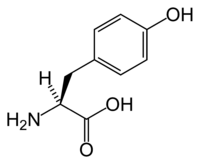Tyrosinemia Type 2

Tyrosinemia type 2 is a genetic disorder in which individuals have elevated blood levels of the amino acid tyrosine, a building block of most proteins. This condition can affect the eyes, skin, and intellectual development. Symptoms of tyrosinemia type 2 often begin in early childhood and include excessive tearing, abnormal sensitivity to light (photophobia), eye pain and redness, and painful skin lesions on the palms and soles (palmoplantar hyperkeratosis). About 50 percent of individuals with this condition have an intellectual disability. Tyrosinemia type 2 is caused by a deficiency of the enzyme tyrosine aminotransferase, one of the enzymes required for the multi-step process that breaks down tyrosine. This enzyme shortage is caused by mutations in the TAT gene. This condition is inherited in an autosomal recessive manner. There is no cure for this condition; however, some of the symptoms may be managed with a diet that limits certain amino acids, such as phenylalanine and tyrosine. A medication called NTBC may also be used to help control the amount of tyrosine in the body.